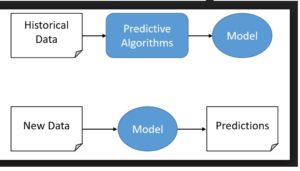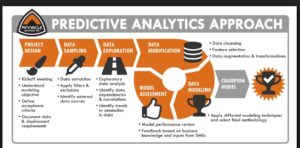Predictive analysis is a branch of analytics which deals with predicting future outcomes. Organizations are implementing predictive analytics to understanding the needs of the future so that they can stay ahead of their rivals. Other analytical tools analyze after an event has occurred but predictive analytical tool predicts the outcome of an event before the event has actually occurred. Predictive analytics should definitely be a part of SDLC as it will apply algorithms to find future outcomes. Hence it will help you in improving delivering time-lines and quality of the product.
How does the Predictive analytics work?
Predictive analytics takes help of the historical data and try to find the relationship between data points. It then predicts future trends like what lead to a decrease in the sales of the product or when there would be an increase in the service outage. It used a technique which is known as dynamic baselining where this will continuously track the performance indicators of the application. It then predicts the threshold. It does that with the help of machine learning which helps in predictive future threshold based on the historical data present. This information can be shared to the DevOps service providers team India and they can adjust the resources so that they can prevent an outage in the future. Dynamic baselining is a process in which threshold is set on the basis of historical data. If the threshold value surpasses this defined value then an alert can be sent out to different teams and teams can respond to these alerts.

Predictive analytics – Case Study
Suppose you are a DevOps enthusiast and you started your deployment which had 20 steps. Now after 2 years down the lines, you have 200 steps in the deployment script. The additional test may be doing something abnormal in the process eg. Reducing the noise in the alerts and hence, monitoring teams fail to respond to the alerts. Your deployments have become much complex over time and the time associated with these steps also increase over time. In the case of predictive analytics, you don’t have to give up your old automation version. It will serve as a historical data set for the upcoming analysis.
Suppose in deployment automation you have 3 main tasks to be done. One is deploying the code base, other is deploying the config files and the third one is to deploying the data set. In the deployment automation, every time deploying code base and config files takes the same amount of time but the time associated with deploying data set is increasing with every subsequent automation. This happened because the data set is growing exponentially. So, in this case, the time of deployment automation has increased due to one factor. A human would not get to know the root cause easily and would ignore the just minute difference in the deployment of the data set.

Predictive analytics if integrated with the system would look at the minute change in the time of deployment as it has an earlier record of the time of deployment of data set. It would then send alert to different teams when there is something inappropriate going on. Hence, you would get the future predictions and you would then undergo the changes in the pipeline and your DevOps automation wouldn’t impact even after 2 years. You can imagine how predictive analytics can help in delivering a quality product to the customer and the best part about it is customer satisfaction. Pattern identification, Risk Scores, and Risk Origin are some factors which predictive analysis will concentrate on.
Advantages of using Predictive analytics in DevOps
Let’s look at the benefits it provides in DevOps.
- With the help of predictive analytics, the speed of delivery would be increased to the customer. Customer satisfaction would be at the peak after using integrating predictive analytics with DevOps.
- You can easily adjust your DevOps pipeline based upon the future analysis predicted by predictive analytics. In this, you don’t have to act when suddenly a future outcome has popped up but on the contrary, your delivery pipeline would be ready to adjust to the future changes.
- Based on the future outcome if we could avoid the changes that can trigger a bad event in the future then you will definitely get rid of all kinds of adversaries.
- Organizations will be able to deliver the software with a faster pace and with better quality when predictive analytics will be integrated with SDLC.
- Downtime in the delivery pipeline can lead to huge loss but with predictive analytics, you would be able to identify these events earlier. Hence, you can avoid this downtime and which would lead to increased revenue.
- In DevOps there are servers and machines on a massive scale which are connected with each other and if one machine goes down, it can disrupt the whole system. Human predictions are not that accurate about service degradation. Use of algorithms in predictive analytics can help you in getting reliable predictions.
- Service degradation can be resolved easier before the outage and hence predictive analytics helps in reducing the frequent service degradation.
- Predictive analytics takes care of the communication media between different servers and machine and hence, then predicts the root cause of the issue before they become a severe problem in the future.
- Predictive analytics also takes care of all the third party tools and helps in predicting the downtime for them. It hence reduces the latency.
Conclusion
So, you got to know that predictive analysis is very important in any field of SDLC. If we talk about DevOps then also it can lead to various changes so that the efficiency of the delivery pipeline can be increased and it can be prone to various future changes. It will help in delivering a perfect product to the customer and customer satisfaction can really go on when you will manage the service degradation before outages. What else one requires? You can predict the outcome future in a future event much before they have occurred. This can reduce all kind of adversaries. So implement Predictive analysis in DevOps and streamline your process. All the best!
